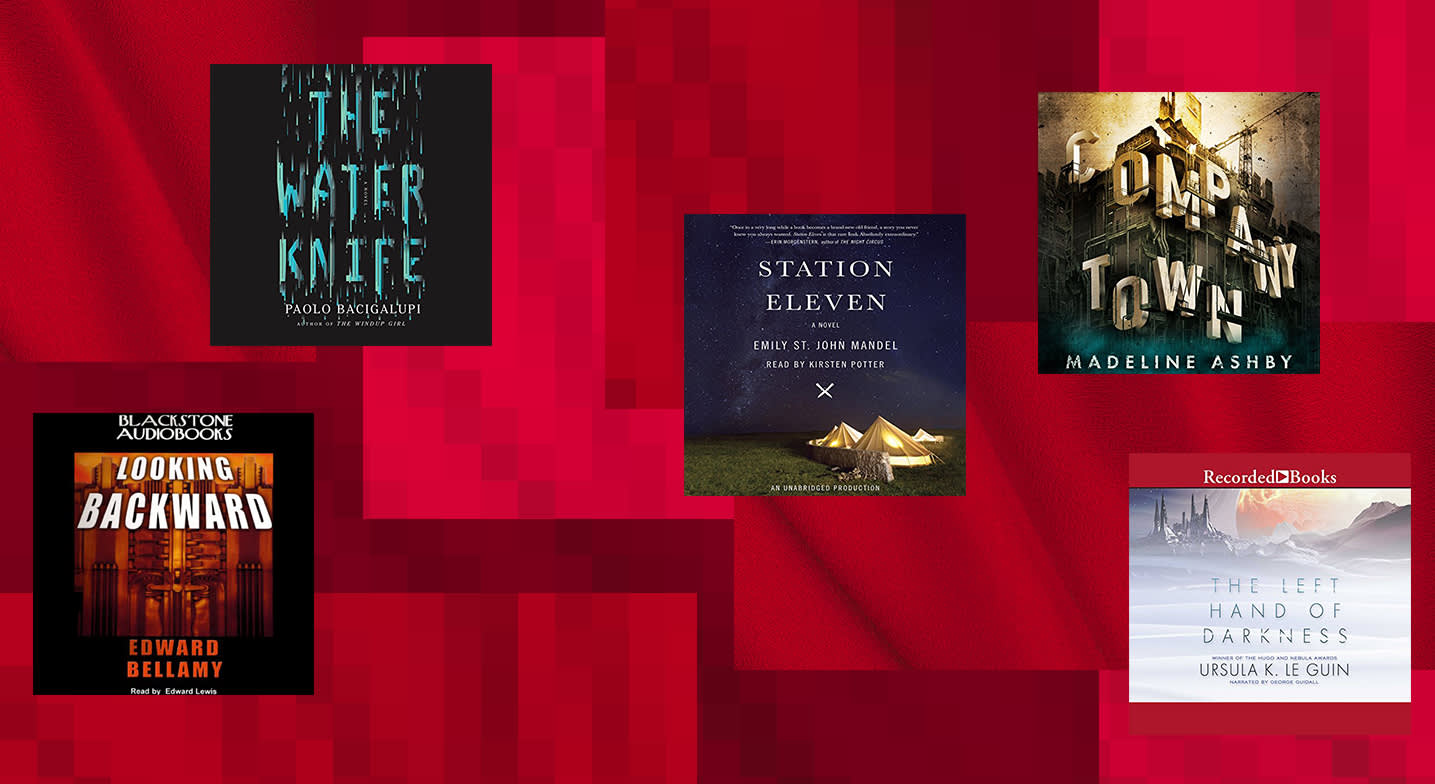A version of this article appeared originally on Omnivoracious, The Amazon Book Review.
There is still some fuzziness around the terms “speculative fiction” and “science fiction.” Some say that “speculative fiction” includes such things as horror and reality-based dystopias and vampire stories, with “science fiction” being a subset. Others make a distinction between “science fiction” — hard and soft, but involving other planets and universes accessed by devices we do not currently have and cannot realistically expect to have — and “speculative fiction,” located on this Earth and containing no devices that we cannot currently foresee.
Let’s just say that there is a difference in nature between stories set in a universe far, far away (some call these “science fiction fantasy”) and those set on this planet, in a future we can plausibly describe, though not infallibly predict. (No predictions are infallible.) All fictions both entertain — otherwise nobody turns the pages — and also instruct, because stories will inevitably be given a moral interpretation by readers, language and people being what they are. But the far, far away galaxy kind — let us call them “zucchinis” — will inspire less immediate fear than the other kind — let us call them “beets.”
Below is a list of “beets.” There are many more, but these are some of the books I have read and enjoyed. They concern this Earth and what is possible on it, given the knowledge available at the time of their writing. They are mostly dystopias — they describe a world we would rather not have. But some are utopias — they point to improvements. Every utopia contains a little dystopia, and every dystopia contains a little utopia, or at least a better world.
Otherwise, farewell to hope and fear.
The old original; perhaps the first twentieth-century dystopia. Plague followed by social chaos; emphasis on evils wrought by oligarchy; but a better world in the future, which looks back on these horrible times. Inspired 1984.
The nineteenth century sprouted utopias in great profusion. What shall we say of The Coming Race, by Edward Bulwer-Lytton? Or A Crystal Age, by W.H. Hudson? Or News from Nowhere, by William Morris? Not everyone has the stomach for the ornate vocabulary in these, despite the flowing robes of the outfits. Looking Backward is more "20th C" in its briskness, and it predicted credit cards, for what that’s worth. But — whisper who dare — it highlights one of the problems with utopias: They can be boring. Everyone is so Good.
You do know about this one! Man frightened by Hollywood underwear and hedonism writes utopia in which man addled by Shakespeare and religion comes to grief. Which is better, shopping or a soul? Your choice!
You know about this one, too. And you need to know. Orwell nailed fake news and distortions of language before anyone else did. He was writing about the Soviet Union of 1948, but this book is eerily relevant, which is why it’s right back up there on the best-seller lists. Orwell knew Double Plus Ungood when he saw it.
I snuck this one in even though it is technically a zucchini rather than a beet — being set on another planet — because I like it a lot, and because it’s even more relevant now than when it was written. The two kinds of society described have lessons for us all — I prefer the society that goes in for court intrigues rather than wars, but I may be very old-fashioned. As for the gender-shifting, “intersectionality” doesn’t even touch it. Radical in the ways it forces the reader to imagine other ways of being human.
Technically a utopia — the future world the narrator either really travels to or hallucinates is “better” than ours, in some respects — but you may have your doubts. It tackles various social issues, especially those concerning gender, unsparingly and with considerable ferocity, and forces the reader to decide how he or she might solve these problems. How many non-conformists are you willing to kill? (Brave New World relocates them to Iceland, but no such luck here.) There is another future in this book, too: highly dystopic, except for the rich. And kind of weirdly familiar.
Among the first fictions that you might term “eco-feminist,” if you were in a terming mood. This series is now a classic, and underlines a true thing: The condition of women and the condition of the environment are closely joined. These three books follow the small community of Earthseed as it struggles against both horrible conditions and horrible people. Much to ponder.
A “climate fiction,” among other things. Yes, there will be water wars. And there will be enforcers, strong men, assassins … A “water knife” is a hired gun for big water interests. We follow one of these on his skullduggericious rounds (I made that word up, but it’s not too shabby), as he slogs through the mud of necessity towards some kind of revelation. Philip Marlowe on speed, with water as blue gold.
Post-apocalyptic novels, understandably, tend to be bleak affairs bereft of much hope. Chalk it up to Canadian politeness and optimism, but that makes Station Eleven’s surprising hopefulness something of a rarity in apocalyptic fiction. Don’t be mistaken: The novel does still have things like a world-ending pandemic, a dangerous pseudo-religious Prophet trying to rule the post-apocalypse, and a good deal of death and grief. But what the novel is ultimately about is the restorative power of how our lives intersect with others, and the possibility that what is lost can maybe (slowly) be regained. Narrator Kirsten Potter especially does a magical job of bringing out the novel’s hope and humanism.
A tough female central character who’s a misfit because she’s not genetically enhanced, an authoritarian offshore oil-rig community — oligarchy become oiligarchy — and you’re off and run-run-running in this noir version of something we might well become, and, in some areas of the world, already are. This author doubles as a “futurist,” so pay attention. She’s also well up on the progress of AI, if progress it is.















